RESISTANCE CINEMA Presents “WILLIAM KUNSTLER, DISTURBING THE UNIVERSE” A film by Emily and Sarah Kunstler, Off Center Media, narrated by Emily Kunstler, (2009, 86 minutes)
![]() This event is a collaboration with P.O.V. PBS' award-winning nonfiction film series. http://www.pbs.org/pov
This event is a collaboration with P.O.V. PBS' award-winning nonfiction film series. http://www.pbs.org/pov
WHEN: Sunday November 28, 1:15PM
WHERE: Community Church of NYC, Gallery Room 28 East 35th st. @ Park Ave.
ADMISSION: Free; donations appreciated
SPECIAL GUEST: SARAH KUNSTLER
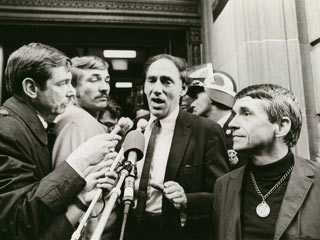 It would be quite a challenge for anyone to make a film about attorney William M. Kunstler. His life had an extraordinarily complex trajectory from an uncontroversial suburban lawyer in the 1950s to an icon of the great social struggles of the 1960s who later grew to be reviled as a defense lawyer when he began to take on clients who were universally despised. If he was your father that challenge could be daunting.
It would be quite a challenge for anyone to make a film about attorney William M. Kunstler. His life had an extraordinarily complex trajectory from an uncontroversial suburban lawyer in the 1950s to an icon of the great social struggles of the 1960s who later grew to be reviled as a defense lawyer when he began to take on clients who were universally despised. If he was your father that challenge could be daunting.
Would objectivity be at all credible? Would an idealized hagiographic portrait be unavoidable? What makes DISTURBING THE UNIVERSE so special and effective is that those questions are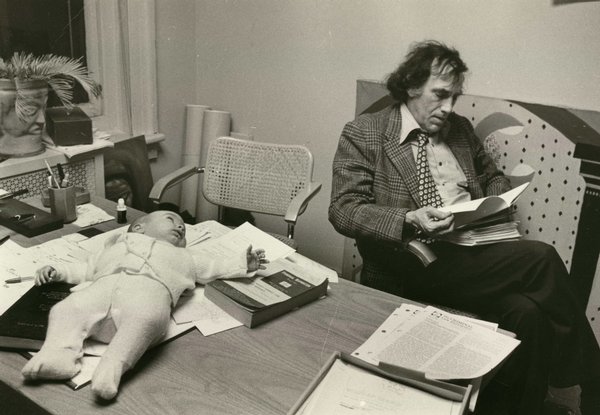 confronted honestly and with great power by daughters Emily and Sarah Kunstler. The trap would have been to make a film that was overly reactive to those anticipated critiques. Instead, the intelligent choice was made to seize on the relationship as a strength whose precise value lies in its being a very unique portal through which the rest of us can see and understand Kunstler. There is no effort to conceal or in any way minimize the relationship between the filmmakers and their subject. In fact the film opens with a family home movie of Sarah and Emily as little children. It is they who are at center stage as they introduce their famous father.
confronted honestly and with great power by daughters Emily and Sarah Kunstler. The trap would have been to make a film that was overly reactive to those anticipated critiques. Instead, the intelligent choice was made to seize on the relationship as a strength whose precise value lies in its being a very unique portal through which the rest of us can see and understand Kunstler. There is no effort to conceal or in any way minimize the relationship between the filmmakers and their subject. In fact the film opens with a family home movie of Sarah and Emily as little children. It is they who are at center stage as they introduce their famous father.
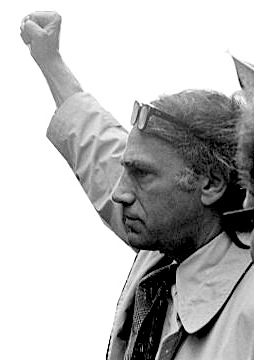 They then proceed to explore his very public life. In the 1960s and 70s, Kunstler fought for civil rights with Martin Luther King Jr. and represented the famed “Chicago 8” activists who protested the Vietnam War. When the inmates took over Attica prison, or when the American Indian Movement stood up to the federal government at Wounded Knee, they asked Kunstler to be their lawyer.
They then proceed to explore his very public life. In the 1960s and 70s, Kunstler fought for civil rights with Martin Luther King Jr. and represented the famed “Chicago 8” activists who protested the Vietnam War. When the inmates took over Attica prison, or when the American Indian Movement stood up to the federal government at Wounded Knee, they asked Kunstler to be their lawyer.
To his daughters, it seemed that he was at the center of everything important that had ever happened. But when they were growing up, Kunstler’s clients included rapists, gangsters and assassins. The public turned against him, the safety of his family was threatened and even Sarah and Emily felt distanced and questioned their father’s choices. At one point they concluded that he had “completely lost his mind.” Coming to grips with that period in their lives now as adults is one of the leitmotifs of the film and it is handled with great skill.
Emily Kunstler’s narration is succinct and powerful as she guides us through a wonderful tapestry of archival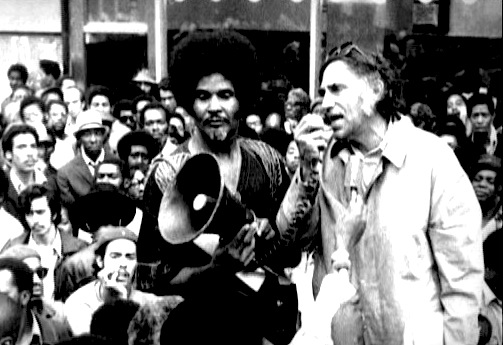 footage that keeps the film active and moving. There are gripping scenes from the 1960s Civil rights period in the south, the Chicago 7 trial in Chicago in 1969, some remarkable footage of the massacre at Attica State Prison in 1970, meetings with the American Indian Movement, and threatening protesters outside the Kunstler family’s New York apartment in the 1980s. A variety of famous personages from Harry Belafonte, Alan Dershowitz, Dennis Banks, Tom Hayden, to their mother Margaret Ratner Kunstler give insightful commentary to deepen the narrative. The result is a uniquely moving film whose humanness can be inspiring.
footage that keeps the film active and moving. There are gripping scenes from the 1960s Civil rights period in the south, the Chicago 7 trial in Chicago in 1969, some remarkable footage of the massacre at Attica State Prison in 1970, meetings with the American Indian Movement, and threatening protesters outside the Kunstler family’s New York apartment in the 1980s. A variety of famous personages from Harry Belafonte, Alan Dershowitz, Dennis Banks, Tom Hayden, to their mother Margaret Ratner Kunstler give insightful commentary to deepen the narrative. The result is a uniquely moving film whose humanness can be inspiring.
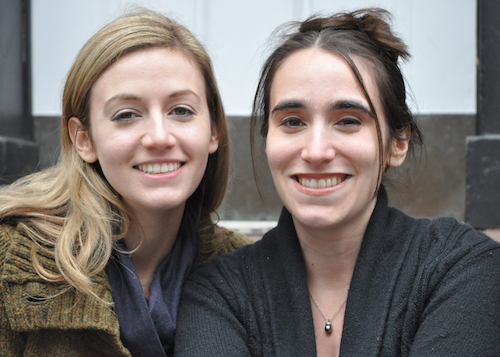 EMILY KUNSTLER & SARAH KUNSTLER
EMILY KUNSTLER & SARAH KUNSTLER